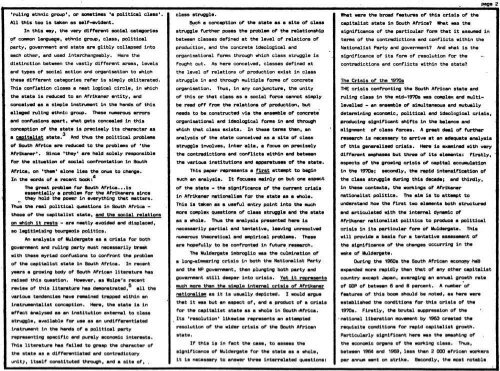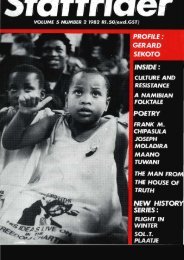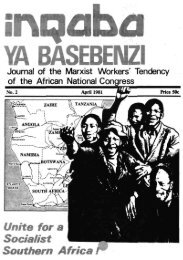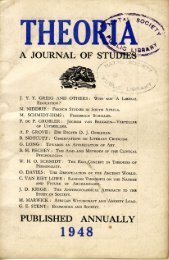Create successful ePaper yourself
Turn your PDF publications into a flip-book with our unique Google optimized e-Paper software.
'ruling •tunic group'» or eo*etia*s 'a political class'.<br />
All this too is taken as self-evident.<br />
In this say, tha vary dlffarant social categories<br />
of coavaon language, ethnic group, class, political<br />
party* government and stata ara glibly collapsad Into<br />
aach other, and usad Interchangeably. Hara tha<br />
dlatlnctlon bataaan tha vastly dlffarant areas, levaIs<br />
and typas of social action and organisation to anion<br />
thasa dlffarant catagorlas rafsr is sieply obliterated*<br />
This conflation closes a naat logical clrcla, in ehlch<br />
tha atata is raducad to an Afrikanar entity, and<br />
concalyad as a simple instrument In tha hands of this<br />
alleged ruling athnic group. Thasa numerous arrors<br />
and confusions apart, ahat gats concaalad in thla<br />
concaptlon of tha atata Is precisely its character as<br />
a capitalist stata. And thus tha political problaas<br />
of South Africa ara raducad to tha problem of 'the<br />
Afrikaner*. 81nca 'they* ara hald solaly responsible<br />
for tha situation of aocial confrontation In South<br />
Africa, on 'the*' alona llaa tha onua to changa.<br />
In tha eords of a racant bookt<br />
Tha graat problem for South Africa...la<br />
assantlally a problem for tha Afrikaners slnca<br />
thay hold tha poamr In avarything that matters.<br />
Thua tha raal political questions in South Africa -<br />
thoaa of tha capitalist stata, and the social relations<br />
on ohjch it raats - ara naatly mvoidad and displaced,<br />
ao legitimising bourgeois politlca.<br />
An analysis of muldergata as a crials for both<br />
government and ruling party must nacasaarlly break<br />
alth thasa myriad confusions to confront tha problem<br />
of tha capitalist atata In South Africa. In racant<br />
yaars a growing body of South African litaratura has<br />
ralsad this question. Hoeaver, as Volga's racant<br />
revle-s of this litaratura has demonstrated, all tha<br />
varioua tandanclaa hava remained trappad althin an<br />
instrumentalist concaptlon. Hara, tha state ia in<br />
affact analysed aa an lnatltution external to class<br />
struggle, available for uaa as an undiffarantlatad<br />
instrument in tha hands of a political party<br />
raprasantlng spaciflc and puraly economic Interests,<br />
Thla litaratura haa fallad to grasp tha charactar of<br />
tha stata as a diffarantlatad and contradictory<br />
unit/t ltsalf conatltutad througn, and a sits of, „<br />
class atruggla.<br />
Such a concaptlon of tha stata aa a aita of class<br />
struggls furthar poses tha problem of tha relationship<br />
bataaan classas dafined at tha laval of relations of<br />
production, and tha concrata ldaologlcal and<br />
organisational fonts through which class struggls is<br />
fought out. As hara concaivad, classas dafinad at<br />
tha laval of ralatlons of production exist in class<br />
struggls in and through multiple fonts of concrata<br />
organisation. Thus, in any conjunctura, tha unity<br />
of this or that class as a social force cannot simply<br />
be rsad off fro* tha ralatlons of production, but<br />
needs to ba constructed via tha ensemble of concrata<br />
organisational and ldaologlcal forms in and through<br />
which that claaa axiats. In thaaa tarsia than, an<br />
analysla of tha atata concaivad as a alta of class<br />
atruggla lnvolvaa, intar alia, a focus on praclsaly<br />
tha contradictions and conflicts althin and bataaan<br />
tha varioua institutions and apparatuses of tha state.<br />
This papar rapraaants a flrat attempt to bagln<br />
such an analysis. It focuses mainly on but ona aspact<br />
of tha stata - tha signlflcanca of tha currant crisis<br />
in Afrikanar nationalism for tha stata as a ahola.<br />
This la takan as a uaaful antry point into tha much<br />
aora Caspian quastlons of class struggls and tha atata<br />
as a ahola. Thua the analysla prasantad hara la<br />
nacasaarlly partial and tentative, leaving unraaolvad<br />
nutrous thaoratical and saiplrlcal problema* Thaaa<br />
ara hopafully to ba confrontad in futura rasaarch.<br />
Tha lluldargata itibrogllo aaa tha culmination of<br />
a long-aiaaiaring crisis in both tha Nationalist Party<br />
and tha HP government, than plunging both party and<br />
government still daapar into crisis* Yat it rapraaants<br />
much mora than tha simple lntamal crisis of Afrikaner<br />
nationalissi as it is usually daplctad. I would argue<br />
that It aaa but an aspact of, and a product of a crisis<br />
for tha capitalist stata as a ahola in South Africa.<br />
Ita 'resolution' llkasriaa rapraaants an attaaptad<br />
resolution of tha wider crisis of tha South African<br />
atata.<br />
If this if in fact tha caaa, to assess tha<br />
signlflcanca of Wuldergate for tha stata as a ahola,<br />
it ia necessary to answer thrsa intarralatad quastlons:<br />
Ihat aara tha broad features of thla crisis of tha<br />
capitalist stata in South Africa? «hat mas tha<br />
q»q«<br />
signlflcanca of tha particular for* that it assumed in<br />
tanas of tha contradictions and conflicts althin tha<br />
Nationoliat Party and govarnmant? And ahat la tha<br />
signlflcanca of its for* of resolution for tha —<br />
contradictions and conflicts althin tha stata?<br />
Tha Crisis of tha 1970a<br />
THE crisis confronting tha South African stata and<br />
ruling class in tha arid* 1970a aaa complex and eultl-<br />
lavallad - an ensemble of simultaneous and mutually<br />
dwtemining economic, political and ldaologlcal crials,<br />
producing significant shifts In tha balanca and<br />
alignment of class forces, A graat daal of furthar<br />
rasaarch la nacasaary to arrive at an adequate analysis<br />
of this ganarallsad criaia. Hara Is examined vith vary<br />
dlffarant oepheees but three of its elements: firstly,<br />
aspects of tha growing crisis of capital accumulation<br />
In tha 1970a: tacondly, tha rapid Intensification of<br />
tha class struggls during this decade; and thirdly,<br />
in thaaa contexta, tha aorfelnga of Afrikanar<br />
nationalist politics. Tha alsi la to attempt to<br />
understand hos tha flrat tao elements both structured<br />
and articulated alth the internal dynamic of<br />
Afrikaner nationalist politlca to produce a political<br />
crisis in its particular for* of muldergata. Thla<br />
• ill provide a basis for a tantatlva aeasisment of<br />
tha signlfloanca of tha changes occurring in tha<br />
sake of lluldargata.<br />
Ourlng tha 1960a tha South African economy had<br />
expanded mora rapidly than that of any other capitalist<br />
country except Japan, averaging an annual growth rata<br />
of GOP of bataaan 6 and S parcant. A number of<br />
features of this boo* should ba noted, aa hera aara<br />
established tha condltiona for this crisis of tha<br />
1970s. Flratly* the brutal aupprasalon of tha<br />
national liberation movement by 1963 created the<br />
requisite condltiona for rapid capitalist growth*<br />
Particularly significant hare ass tha eamshing of<br />
tha econoalc organe of tha stocking class. Thus,<br />
bataaan 1964 and 1969, leas than 2 000 africen eorfcars<br />
par annus) aant on atrlka. Secondly, tha moat notable

















